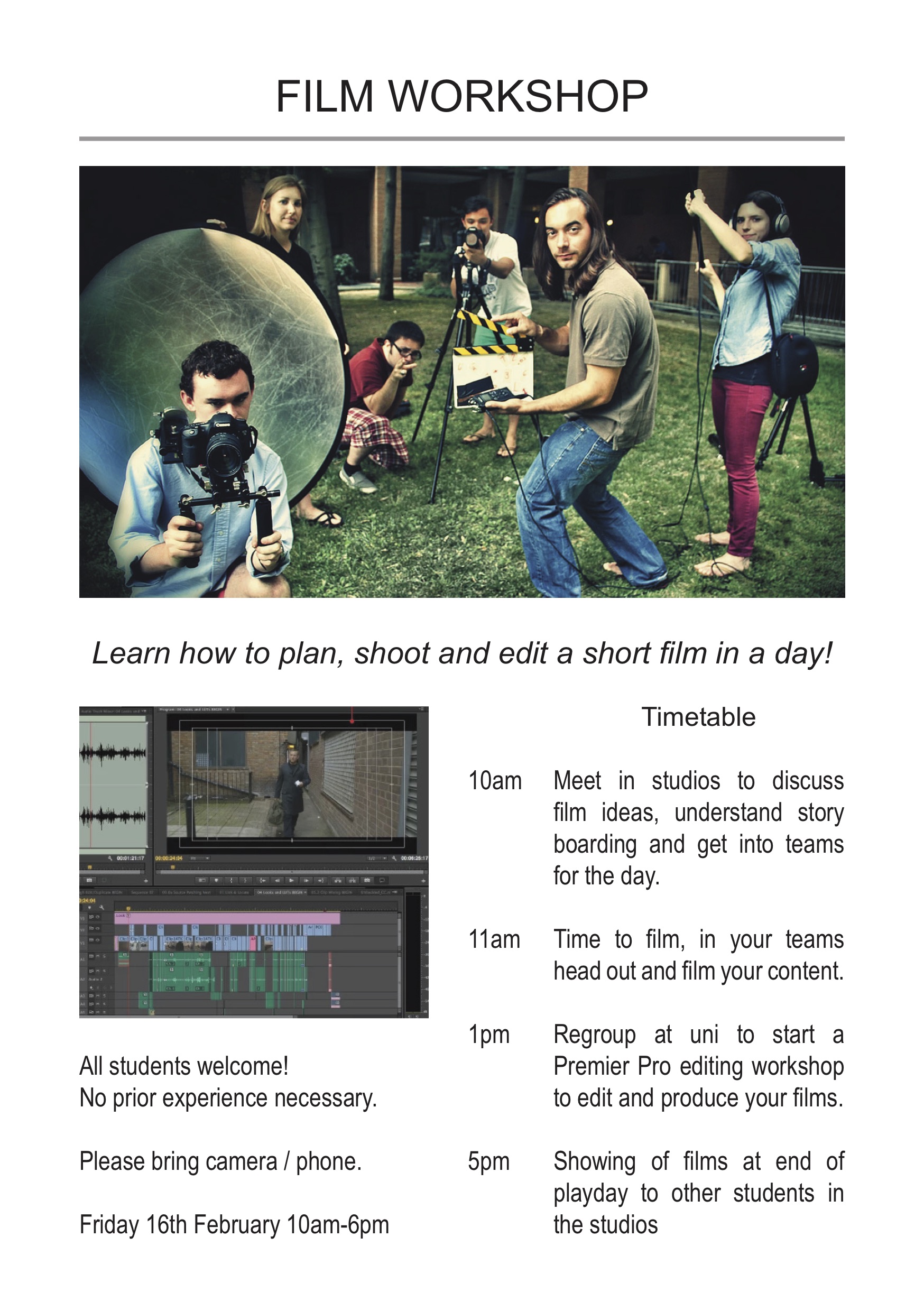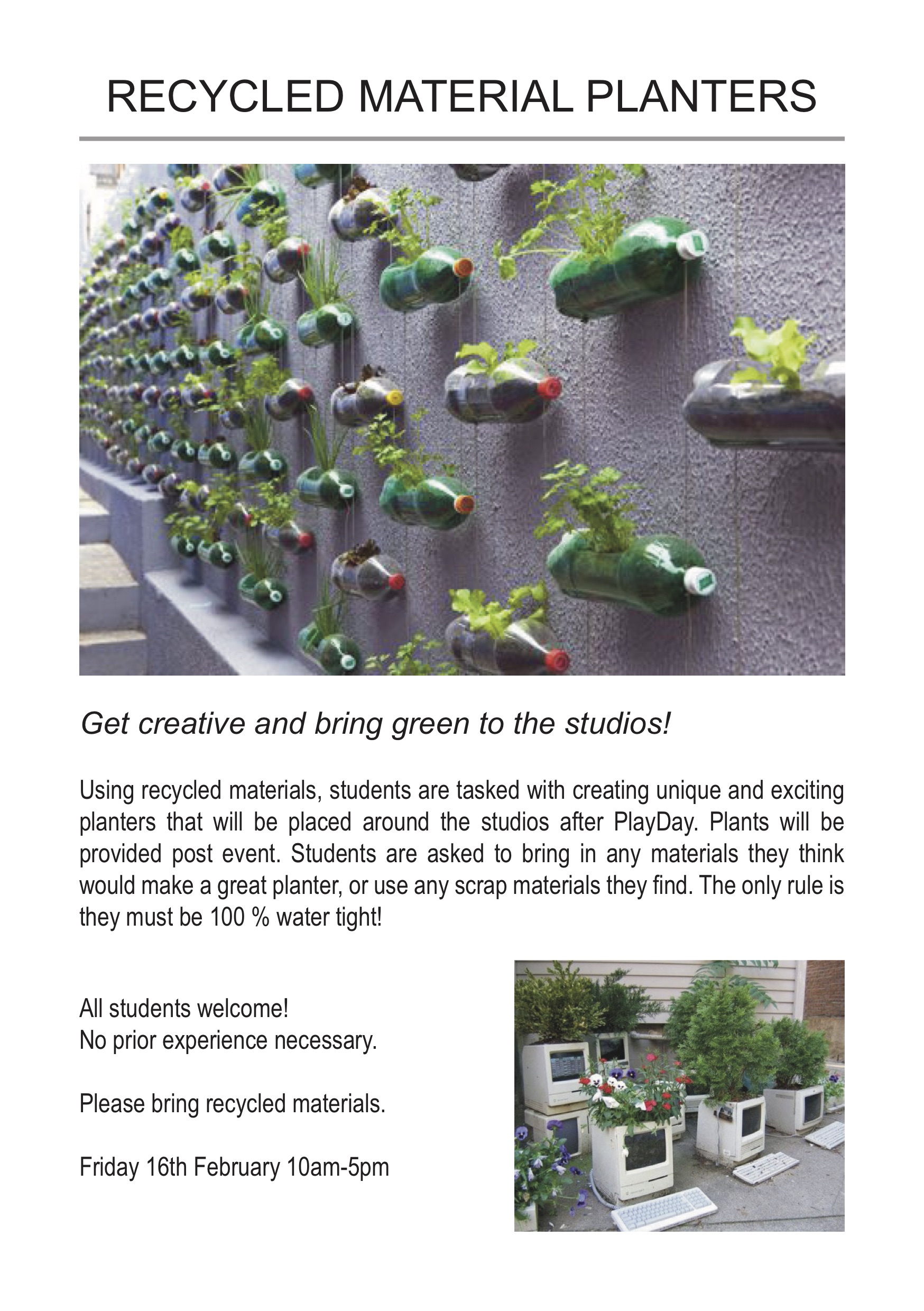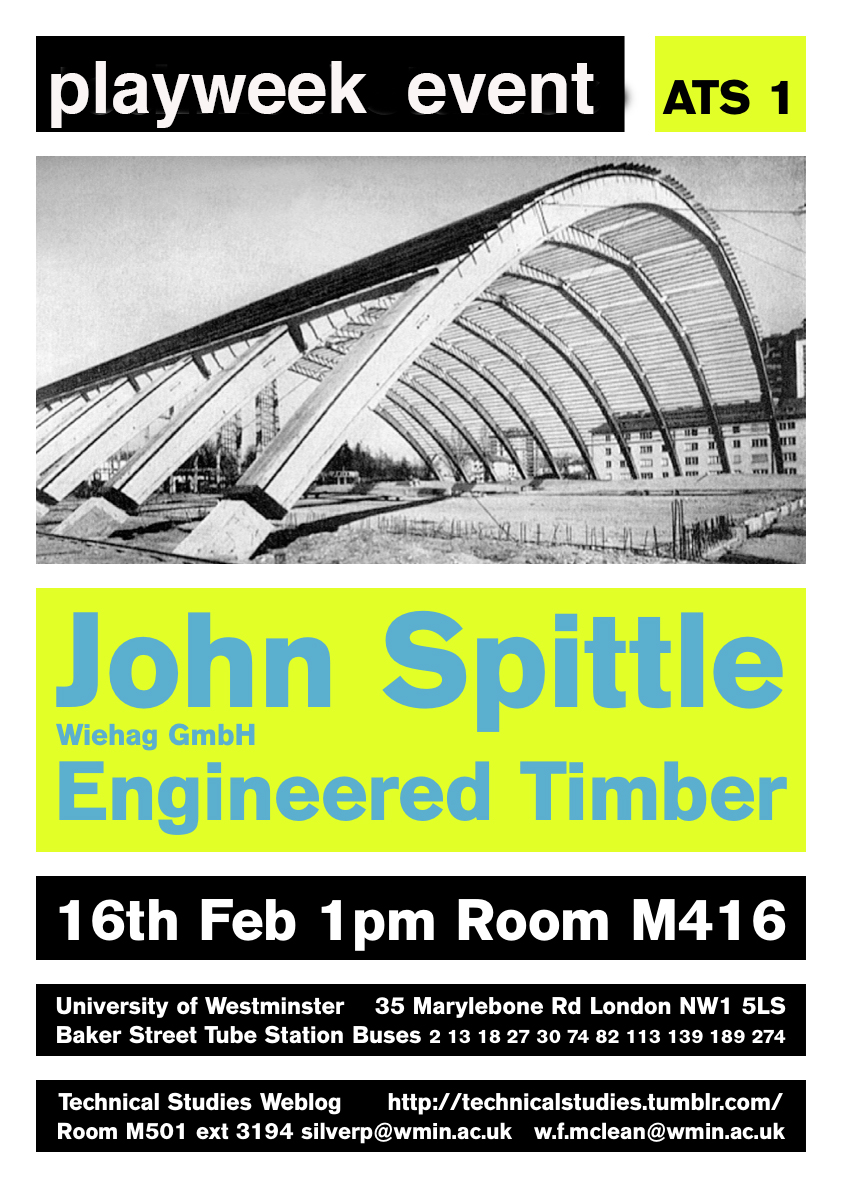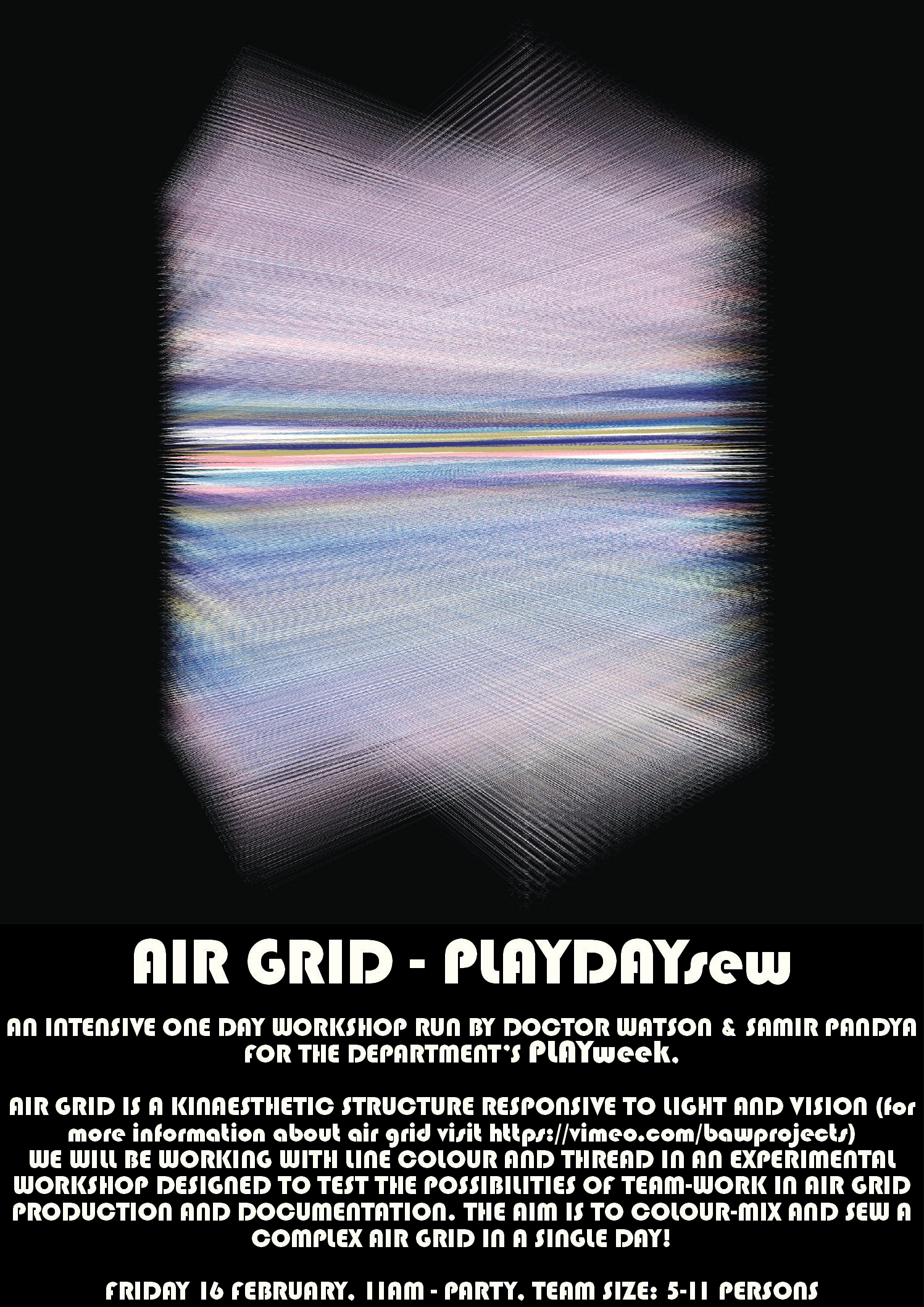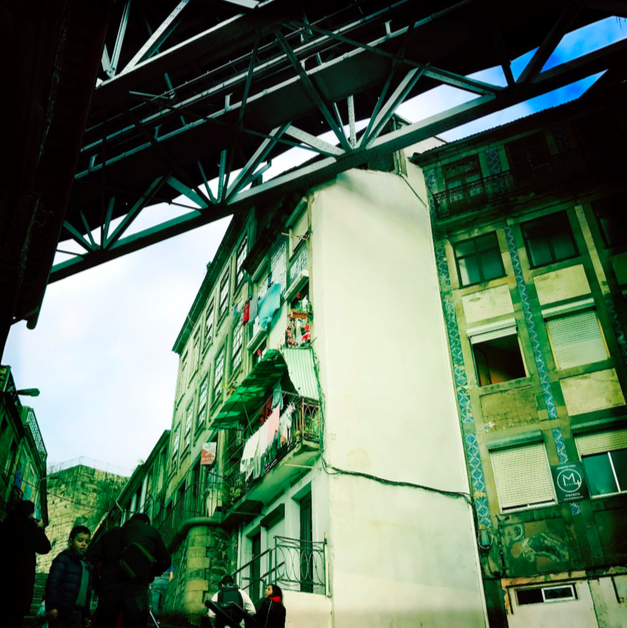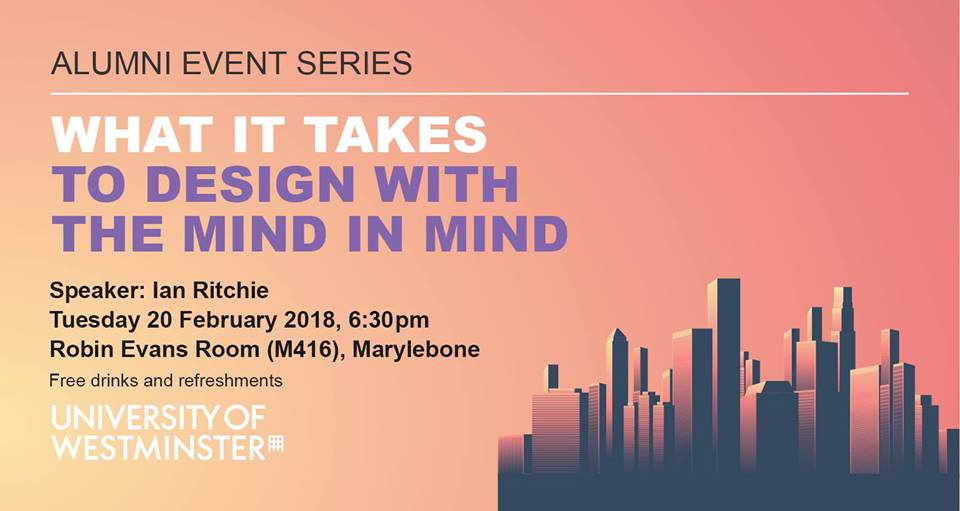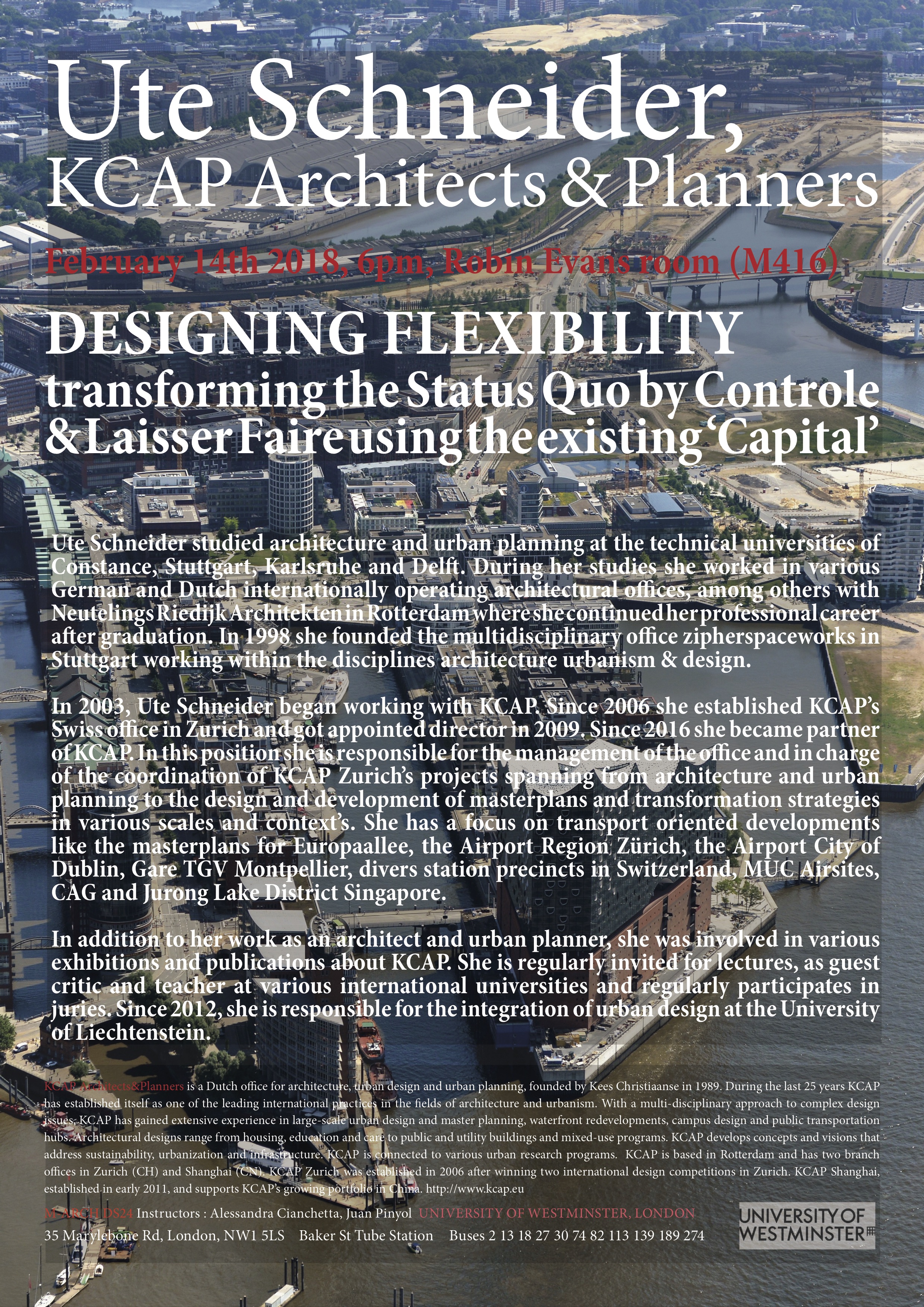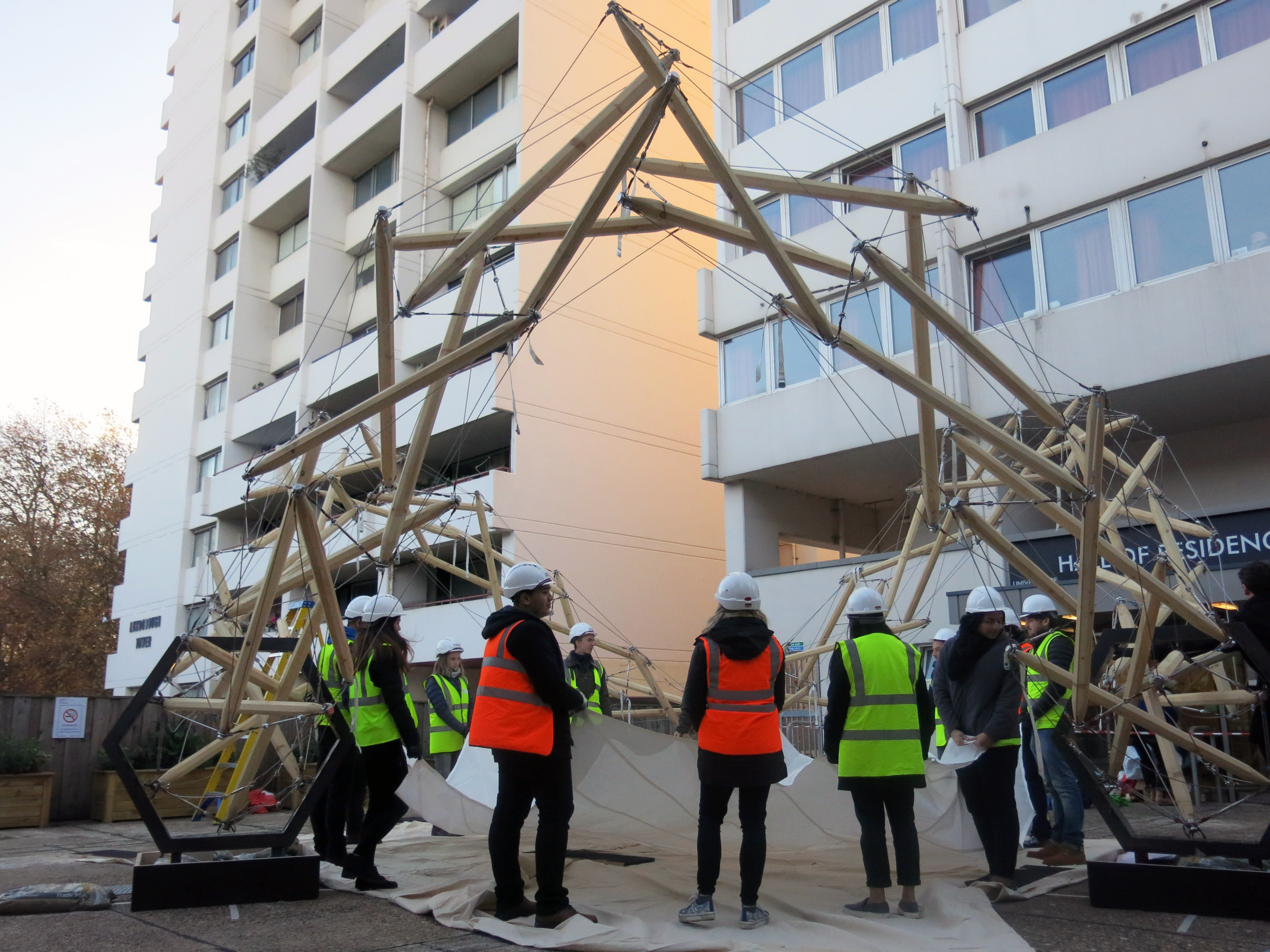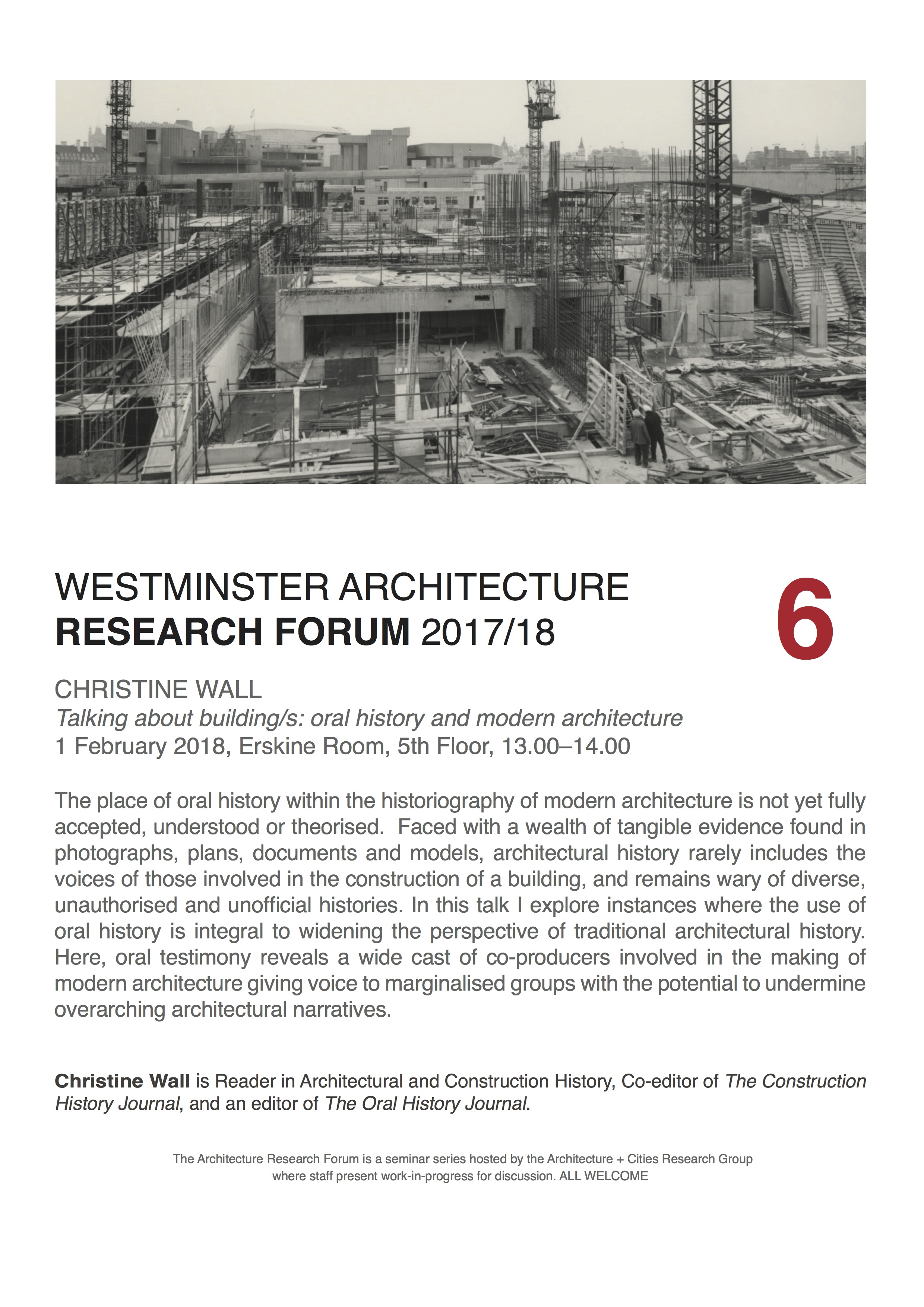Organised by Westminster Architecture Society.
Category: Events
PLAYweek Workshop Proposal: Recycled Material Planters
Organised by Westminster Architecture Society.
PLAYweek Event: John Spittle – Wiehag “Engineered Timber” – Friday 16th February, 1pm, Robin Evans Room M416
PLAYweek Event
Talk by John Spittle – Wiehag
Title: Engineered Timber
When: Friday 16th February, 1pm
Where: Room M416
Wiehag is a family-owned company in its fifth generation, with 160 years of experience in manufactured, timber products. John has worked in the offsite industry for over 30 years, the last five of which have been with Wiehag. John has been involved in some of the largest timber engineering projects ever carried out in the UK, and has experience in all forms of timber engineering.
In 1999, Wiehag opened Europe’s largest plant for glued laminated timber construction in Altheim Austria, in whose forests a cubic meter of wood grows every second. It is estimated that one third of the annual growth of Austrian wood would already suffice to build all buildings with this material.
For details contact Pete Silver/Will McLean – w.f.mclean@westminster.ac.uk
www.technicalstudies.tumblr.com
PLAYweek Workshop Proposal: AIR GRID – PLAYDAYsew
AIR GRID – PLAYDAYsew
An intensive one day workshop run by Doctor Watson & Samir Pandya for the Department’s PLAYWeek.
AIR GRID is a kinaesthetic structure responsive to light and vision.
We will be working with line colour and thread in an experimental workshop designed to test the possibilities of team-work in air grid production and documentation. The aim is to colour-mix and sew a complex air grid in a single day!
When: Friday 16th February, 11am – Party,
Team Size: 5-11 persons
Call for Participation: Symposium ENABLE, KU Leuven, April 2018 – Deadline 16th February
Call symposium ‘ENABLE’
A tribute to Prof. Johan Verbeke
The Faculty of Architecture KU Leuven proudly announces the symposium ENABLE on April 20-22 2018 in association with EAAE, ARENA, EURICUR, eCAADe and ELIA
The European Association for Architectural Education (EAAE), the Architectural Research European Network Association (ARENA), the European Institute for Comparative Urban Research (EURICUR), the association for Education and research in Computer Aided Architectural Design in Europe (eCAADe) and the European League of Institutes of the Arts (ELIA) continue to dedicate themselves to the development of research in all fields of architecture, technology, design and arts. This also includes subjects such as environmental design, sustainable development, interior design, landscape architecture, urban design/urbanism, music, performing arts, visual arts, product design, social design, interaction design, etc.
Together they are organising a symposium as a tribute to Professor Johan Verbeke. The symposium is building further on Johan’s critical approach, his advocacy for designerly thinking in research, his plea for research through design, based on the insights as they emerge during design practice. It is also building further on Johan’s vision to bring together arts and architecture, design and performance, from product design to landscape.
This symposium is called ‘ENABLE’, because we want to discuss the deployability and impact of design thinking, research and practice. This discussion and the cross-over with stakeholders outside the design world, governments, private companies, management thinking, … can be combined in notions such as ‘activating’ and ‘enabling’. Enable means to make able; give power, means, competence, or ability to; to authorise to give (someone) the authority or means to do something; to make it possible for to empower, to facilitate, to implement.
How does the research field of practices reaches out towards building developers, city policy, city planning? And how is the design world reacting to questions and challenges generated from these ‘external’ stakeholders?
Design researchers and PhD students will be able to participate in an environment dealing with research outside the architectural or artistic discipline and research within design studios.
The symposium is structured around three half days with three themes derived from the ‘Enable’-concept:
- ‘Slow modelling’
- ‘Impurity’
- ‘Form influence’
Each theme will include discussants from within and outside academia. Students, end-users and policy makers will be welcomed in each panel.
Rapporteurs will have the responsibility to report back at the end of the symposium. Several rapporteurs are needed for each theme, the results of this report will be used for a journal publication or other publication afterwards.
On both locations of the symposium the exhibition ‘a tribute to Johan’ will be visible. For this exhibition, we invite participants to provide 1 object or poster to be exhibited during the symposium.
Important dates:
- Submission of abstracts for peer review (discussants, rapporteurs and exhibition) at enable.architecture@kuleuven.be by 16th February 2018
- Notification of acceptance: 26th February 2018
- Registration: from 26th February 2018 onwards
- Conference dates: 20th – 22nd April 2018
For further information, please visit the conference website.
History and Theory Open Lecture Series: Peg Rawes “Housing, Biopolitics, and Care” – Tuesday 6th February, 18:00, Robin Evans Room (M416)
The History and Theory Open Lecture Series for the academic year 2017/2018 begins today, with Peg Rawes‘ lecture “Housing, Biopolitics, and Care”.
When: Tuesday, 6th February, 18:00
Where: Robin Evans Room (M416), Marylebone Campus
Peg Rawes is a Professor in Architecture and Philosophy, Programme Director of the MA Architectural History, and a PhD Supervisor for Architectural Design and Architectural History and Theory PhD Programmes at the Bartlett, UCL. Trained in art history and philosophy, her research and teaching focus on material, political, technological and ecological histories and theories of contemporary architecture and art. She regularly gives talks in the UK, EU and overseas, and has recently been invited to give lectures at the Universidad de Buenos Aires, University of Regensburg, University of Minnesota, Iowa State University, The British School in Rome, KTH Stockholm, London School of Economics, KADK Copenhagen and TU Delft.
Other speakers in the series will include:
- 20th February, 17:15, M416: Emma Cheatle (Newcastle University) “As/saying Architecture: A Ficto-Spatial Essay of Lying-in”
- 27th February, 18:00, M416: Tilo Amhoff (University of Brighton) “Architectural History and Theory Between Labour and Capital, 1967-1977”
- 6th March, 18:00, M416: Lindsay Bremner, Andrew Peckham, Douglas Spencer (University of Westminster) “On Archipelago: Three Perspectives”
- 13th March, 18:00, M416: Mark Dorrian (University of Edinburgh) “Auto-Affection: On Michael Webb’s Sin Centre and the Drawing of Mobility”
Alumni Event Series: Ian Ritchie “What it Takes to Design with the Mind in Mind” – Tuesday 20th February, 18:30, Robin Evans Room (M416)
The next guest in the Alumni Event Series will be Ian Ritchie with his talk “What it Takes to Design with the Mind in Mind”.
When: Tuesday, 20th February, 18:30
Where: Robin Evans Room (M416), Marylebone Campus
Free drinks and refreshments provided.
ALL WELCOME!
Ute Schneider “Designing Flexibility” – Wednesday 14th February, 18:00, Robin Evans Room (M416)
Lecture organised by Alessandra Cianchetta and Juan Pinyol, MArch DS24 studio leaders and tutors
When: Wednesday, 14th February, 18:00
Where: Robin Evans Room, M416, Marylebone Campus
Ute Schneider studied architecture and urban planning at the technical universities of Constance, Stuttgart, Karlsruhe and Delft. During her studies she worked in various German and Dutch internationally operating architectural offices, among others with Neutelings Riedijk Architekten in Rotterdam where she continued her professional career after graduation. In 1998 she founded the multidisciplinary office zipherspaceworks in Stuttgart working within the disciplines architecture urbanism & design.
In 2003, Ute Schneider began working with KCAP. Since 2006 she established KCAP’s Swiss office in Zurich and got appointed director in 2009. Since 2016 she became partner of KCAP. In this position she is responsible for the management of the office and in charge of the coordination of KCAP Zurich’s projects spanning from architecture and urban planning to the design and development of masterplans and transformation strategies in various scales and context’s. She has a focus on transport oriented developments like the masterplans for Europaallee, the Airport Region Zürich, the Airport City of Dublin, Gare TGV Montpellier, divers station precincts in Switzerland, MUC Airsites, CAG and Jurong Lake District Singapore.
In addition to her work as an architect and urban planner, she was involved in various exhibitions and publications about KCAP. She is regularly invited for lectures, as guest critic and teacher at various international universities and regularly participates in juries. Since 2012, she is responsible for the integration of urban design at the University of Liechtenstein.
KCAP Architects&Planners is a Dutch office for architecture, urban design and urban planning, founded by Kees Christiaanse in 1989. During the last 25 years KCAP has established itself as one of the leading international practices in the fields of architecture and urbanism. With a multi-disciplinary approach to complex design issues, KCAP has gained extensive experience in large-scale urban design and master planning, waterfront redevelopments, campus design and public transportation hubs. Architectural designs range from housing, education and care to public and utility buildings and mixed-use programs. KCAP develops concepts and visions that address sustainability, urbanization and infrastructure. KCAP is connected to various urban research programs. KCAP is based in Rotterdam and has two branch offices in Zurich (CH) and Shanghai (CN). KCAP Zurich was established in 2006 a er winning two international design competitions in Zurich. KCAP Shanghai, established in early 2011, and supports KCAP’s growing portfolio in China.
PLAYweek, Thursday 15 – Friday 16 February: Call for Workshops & Events
CALL for WORKSHOPS & EVENTS
It should be noted that children at play are not playing about: their games should be seen as their most serious-minded activity. ( Montaigne 1580 )
Introduction
PLAYweek is organised by the Department of Architecture and the Westminster Architecture Society, WAS.
It is a creative and disruptive 2-day event that cuts across the ‘dip-drip’ of the Department’s week-by-week teaching to suggest new and playful ways of working.
This year, things are a little different:
- Thursday 15 February, there will be an all school crit, with mixed student, staff and guest panels looking at work drawn from across the school.
- Friday 16 February, we will run one-day intensive workshops – which students and staff are free to propose, run, and take part in.
Aims
- To hold an all school event
- To enable students and staff to see a cross-section of the ongoing work of the Department
- To test out innovative ideas through short, intensive workshops
- To give students and staff the opportunity to explore an area of interest which they would normally not have the time, or freedom, to investigate
Friday workshop proposals
All students and staff can make a proposal for a workshop or event – and teams may include people drawn from outside the Department
Workshops can include traditional workshop activities, as well as performances and lectures, walks, seminars and film-showings – or any other form of activity. They can take place on or off-campus, and include people from outside the Department.
For more details on how to submit a proposal please go here.
Featured image from last year’s Tensegrity workshop, lead by Geoff Morrow, Gavin Weber, Will McLean, Pete Silver and Scott Batty.
Architecture Research Forum: ” Talking about building/s: oral history and modern architecture” Christine Wall, Thursday 1st February, Erskine Room, 5th Floor, 13:00-14:00
CHRISTINE WALL: Talking about building/s: oral history and modern architecture
The place of oral history within the historiography of modern architecture is not yet fully accepted, understood or theorised. Faced with a wealth of tangible evidence found in photographs, plans, documents and models, architectural history rarely includes the voices of those involved in the construction of a building, and remains wary of diverse, unauthorised and unofficial histories. In this talk I explore instances where the use of oral history is integral to widening the perspective of traditional architectural history. Here, oral testimony reveals a wide cast of co-producers involved in the making of modern architecture giving voice to marginalised groups with the potential to undermine overarching architectural narratives.
Christine Wall is Reader in Architectural and Construction History, Co-editor of The Construction History Journal, and an editor of The Oral History Journal.
The Architecture Research Forum is a seminar series hosted by the Architecture + Cities Research Group where staff present work-in-progress for discussion.
Where: Erskine Room (M523), Marylebone Campus
When: Thursday, 1 February 2018, 13.00–14.00
ALL WELCOME!










